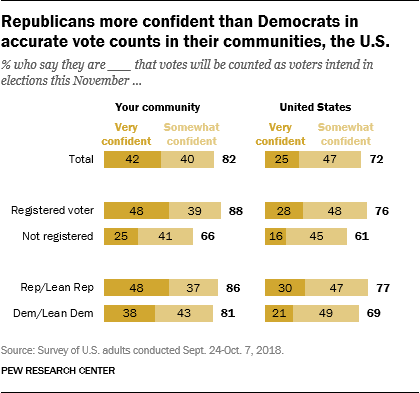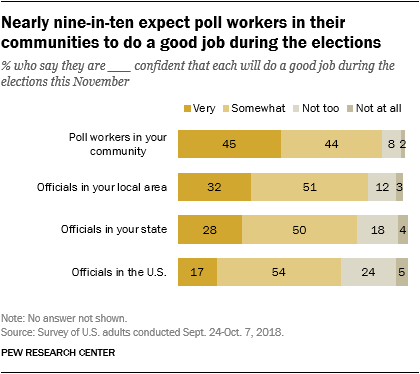Most Americans say they are at least somewhat confident that in the elections this November, votes in their communities and across the United States will be counted as the voters intended. And there is broad confidence that elections – particularly those in their own communities – will be run and administered well.
However, the public is less confident in the security of the elections. A majority of Americans have little or no confidence election systems in the U.S. are secure from hacking and other threats.
Most have confidence votes will be counted accurately

About eight-in-ten Americans are either very (42%) or somewhat (40%) confident that the votes in their communities will be counted as voters intend this November. Fewer (72%) are very or somewhat confident that votes across the country will be counted accurately – with just 25% saying they are very confident about this.
The public also is largely confident that the congressional elections will be run and administered well. Nearly nine-in-ten expect elections in their communities to be run either very well (41%) or somewhat well (46%).
As with confidence in the vote count, public expectations for how elections across the country will be run are not quite as positive as local assessments. Still, about three-quarters of Americans (77%) expect the elections in the U.S. this November to be run at least somewhat well.

Republicans express more confidence than Democrats that votes will be counted as voters intend this November, both in their own communities and in the country as a whole.
Nearly half of Republicans and Republican-leaning independents (48%) say they are very confident in vote counts in their communities, compared with 38% of Democrats and Democratic leaners who say this. There is a similar 9-percentage-point gap between the shares of Republicans (30%) and Democrats (21%) who say they are very confident in the nationwide counts. In both parties, more express confidence that votes will be counted as intended in their communities than say this about votes across the country.
Registered voters express significantly higher levels of confidence that vote counts will be accurate – at both the local and national levels – than adults who are not registered. There is a 22-percentage-point gap between the share of registered voters and unregistered adults who say they are at least somewhat confident votes will be counted correctly in their communities (88% and 66%, respectively). The gap in confidence in vote counts nationwide is similar: 76% of registered voters are very or somewhat confident votes will be counted as intended across the U.S., while 61% of unregistered adults say the same.
Though majorities of adults across age groups, education levels and racial backgrounds say they are at least somewhat confident that votes will be counted as intended both in their communities and across the U.S., there are some differences in the shares who say they are very confident votes will be counted as intended.

Whites are more likely than Hispanics and blacks to say they are very confident ballots will be counted as cast in their community or across the country. Nearly half of whites (47%) say this about votes in their communities, compared with smaller shares of blacks (29%) and Hispanics (30%). The racial and ethnic gap in these views is somewhat less pronounced for votes across the U.S.
Older adults are more likely than younger adults to have high confidence in the vote count in their communities as well as the U.S. more broadly.
Those with higher levels of education are more likely than those with lower levels to say they are confident votes will be counted as intended, particularly in their communities. Nearly six-in-ten (57%) of those with postgraduate degrees are highly confident that votes will be counted in their community as voters intend; only about a third of those with a high school diploma or less education (34%) say the same.
Racial differences in views of election administration
There are similar patterns in opinions about how well next week’s elections will be administered.
Most expect the elections in their communities and in the U.S. will be run well – though about twice as many say their local elections will be run very well as say this about elections in the U.S. overall.

Nine-in-ten whites say the elections in their communities will be administered well, including 47% who say they will be run very well. Most blacks and Hispanics also say elections in their communities will be run well, but are far less likely than whites to say they will be run very well (30% of blacks and 27% of Hispanics).
There also are racial and ethnic differences in expectations of election administration in the U.S., with a wider majority of whites (80%) than blacks (73%) and Hispanics (70%) saying the elections across the country will be run at least somewhat well.
Majorities of Republicans and Democrats say elections will be run and administered at least somewhat well in their communities and in the U.S. overall. However, Republicans are somewhat more likely to say elections will be run and administered very well.
Americans generally are confident that election officials will do a good job during elections this November. And there is greater confidence at the local and state level than at the federal level.

Nearly nine-in-ten (89%) say they are at least somewhat confident community poll workers will do a good job, including 45% who say they are very confident. Only 10% say they are not too confident (8%) or not at all confident (2%) these officials will do a good job.
About eight-in-ten say they have at least some confidence in the officials who run elections in their local area (84%) or in their state (78%), including about three-in-ten who say they are very confident these officials will do a good job.
Roughly seven-in-ten (71%) are either somewhat confident (54%) or very confident (17%) that officials across the U.S. will do a good job running elections, although 29% say they are not too confident (24%) or not at all confident (5%) in this.




